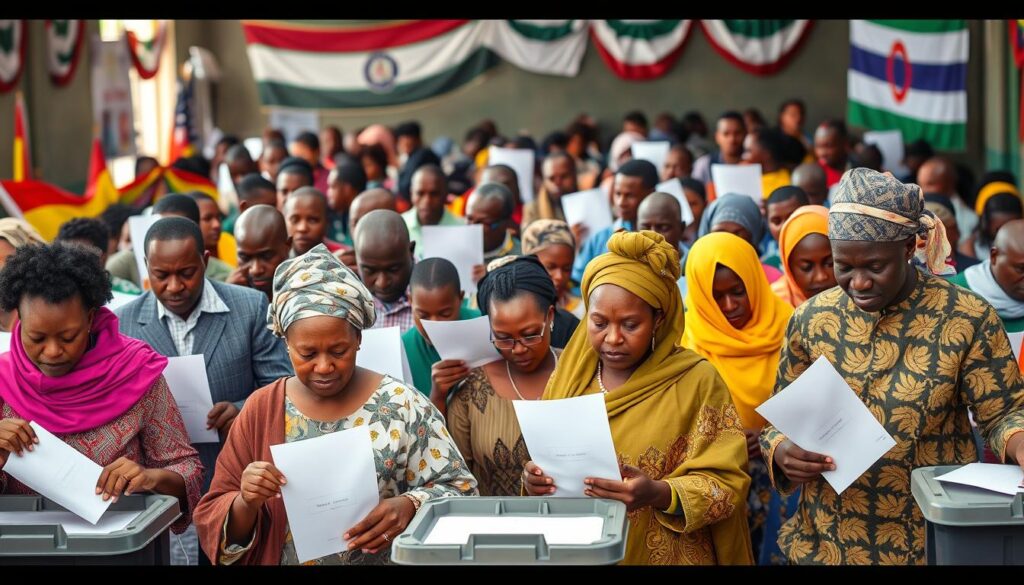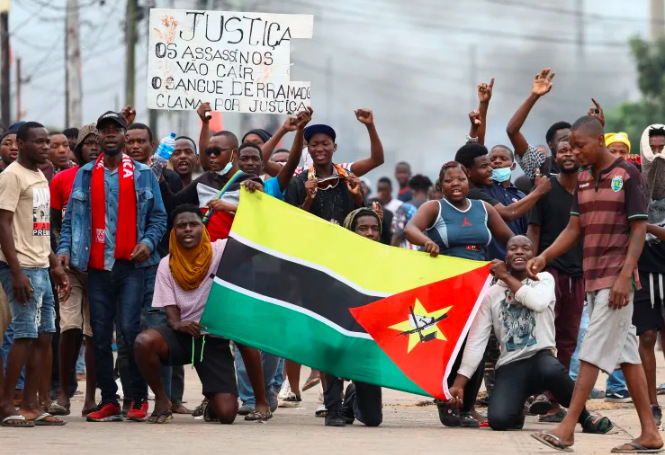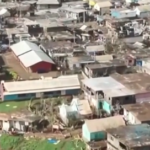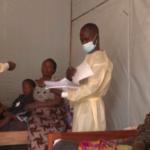As an American living and working in Africa, I’ve seen big changes in politics. In places like Ghana and Botswana, African voters are choosing new leaders over old ones. This shift has really caught my eye, and I want to understand why it’s happening.

What’s causing this big change in voting patterns? How will it affect Africa’s future? We’ll look at economic issues, changes in population, and new technology. These factors are helping people in Africa to ask for better from their leaders. Let’s dive into what’s changing and what it might mean for Africa’s democracy.
Keep Reading:
South Korean Police Raid Presidential Office, ex-minister attempted suicide in custody
The Rising Wave of Electoral Change Across Africa
Voter preferences in Africa have changed a lot. More countries are seeing long-ruling parties lose. This change is happening all over the continent, bringing new democracy and accountability.
Recently, opposition parties won big in places like Senegal, Zambia, and Malawi. They challenged the power of parties that had ruled for years. This change is due to economic issues, young people’s views, and social media’s role in politics.

These wins mean more than just changes in one country. They show voters across Africa want better government. This wave could lead to more openness, honesty, and better lives for everyone.
Now, it’s important to understand what’s behind these changes. Looking at voter choices, political shifts, and opposition strategies will help us see what’s next for African democracy.
African voters are throwing out ruling parties: A Continental Trend
Across Africa, a big change is happening. Voters are kicking out ruling parties and choosing new ones. This is because people are upset about corruption, bad economy, and broken promises.
In countries like Ghana, Botswana, Zambia, and Kenya, voters are making a change. They are choosing new leaders over old ones. This big shift is changing the political scene, as new parties gain power.
The growing dislike for current leaders is a big problem for those in power. People are watching how their leaders do and are unhappy. Issues like a bad economy, jobs, and fair sharing of resources have lost their trust.
Economic Challenges Fueling Political Discontent
Voters across Africa are unhappy with their current leaders. Economic issues like high unemployment, inflation, and income gaps are key reasons. These problems have made many, especially the young, lose faith in their governments.

The youth are hit hard by these economic troubles. They face few job chances and struggle to move up in life. This has led to more young people getting involved in politics, demanding better leadership.
It’s clear that economic struggles lead to political shifts. With the COVID-19 pandemic’s impact, fixing the economy is more critical than ever. Parties that ignore these issues risk losing support from voters who want change and a better economic future.
Youth Demographics: The Game-Changing Factor
Africa’s youth population is growing fast and changing politics. With a median age of 19.7 years, young people are making a big impact. They want leaders who listen and act responsibly.
Young people are using social media to speak up. They want better government and are voting for change. This shift is seen in recent elections, where youth chose new leaders over old ones.
The youth of Africa will keep shaping politics. They face big challenges but are ready to lead. Their voices will push for better government and more inclusion.
Digital Revolution and Political Awareness
The digital revolution is changing Africa’s democratic transitions. It gives voters more access to information and new ways to engage in politics. Social media has made it easier for candidates to reach out to people and build support.
Innovative fact-checking projects are fighting against false information. This helps voters make better choices. Digital tools also help more people, especially the young, get involved in politics. This is a big change in the region’s political scene.
But, the digital world also brings challenges. There’s a need to improve digital skills and fight online lies. As Africa moves forward, dealing with these digital issues will be key. It will shape how voters choose and the future of politics.
COVID-19’s Lasting Impact on Political Trust
The COVID-19 pandemic has deeply affected political trust in Africa. Governments struggled with health and economic crises. Many saw their leaders’ responses as not good enough.
This feeling of distrust has led to many election upsets. Ruling parties are facing big changes.
The pandemic’s economic effects have hurt people’s trust in leaders. Job losses, business closures, and inflation have made things worse. Opposition parties have used this to their advantage.
They present themselves as better options. People, tired of the same old, are looking for change. They hope to solve their economic and social problems.
The pandemic’s social restrictions have also changed politics. Lockdowns and limits on gatherings have changed how campaigns work. They’ve made it easier for opposition parties to reach out to voters.

They use digital platforms and new ways to talk to people. This helps them spread their message of change.
The pandemic’s effects will keep affecting politics in Africa. How well leaders handle these issues will show if they can regain trust. It’s a test of their ability to meet the changing needs of their people.
Opposition Strategies and Coalition Building
In Africa, opposition forces are using new ways to win elections and push for democracy. They are forming coalitions with different groups, focusing on fighting corruption and improving the economy. They also use digital media and local campaigns to reach more people and share their messages.
Leaders like Malawi’s Lazarus Chakwera and Zambia’s Hakainde Hichilema are leading the change. They speak to people unhappy with the economy and government mistakes. These leaders connect with young people, who want better government and more transparency.
More opposition wins in Africa mean more accountability and stronger democracies. As ruling parties struggle to meet people’s needs, opposition groups offer real solutions. This could change the political scene, giving power to citizens and making democracies stronger.
International Community’s Response to African Electoral Shifts
As democratic changes sweep across Africa, the world is watching. Western democracies, regional groups, and international bodies are stepping up. They support fair elections and hold leaders accountable.
Election observers from the African Union, the European Union, and the United Nations are key. They watch over elections to ensure they’re fair. Their work highlights problems like voter suppression and unfair playing fields.
Democracy support programs also play a big role. They help African groups and parties learn about democracy. These efforts aim to empower citizens and strengthen institutions.
Diplomats from around the world are also involved. They talk and negotiate to help Africa’s democratic progress. Their efforts help make elections fairer.
Reforms and Democratic Institution Building
African nations are seeing big changes in their elections. They are focusing on making their democratic systems stronger. This includes improving how elections are run, campaign finance rules, and fighting corruption.
These changes aim to fix issues in the democratic process. They want to make sure elections truly reflect what people want. By making electoral bodies more accountable and independent, Africa hopes to regain public trust in democracy.
But, making these changes is hard. Powerful groups often don’t want to lose their influence. To overcome these challenges, a long-term effort is needed to keep improving democracy and accountability.
The path to stronger democracy in Africa is tough, but there’s hope. African voters are showing they want change. The international community can help by offering support, money, and diplomatic backing for these important reforms.
Future Implications for African Democracy
African nations are seeing a big change as voters are kicking out long-time ruling parties. This change has big implications for the future of democracy on the continent. It raises questions about stability, policy, and how well democracy will stick.
When new governments take over, they face big challenges. They need to balance the desire for quick change with keeping things running smoothly. Voter preferences for better economy and honest government will guide this change.
The democratic transitions will test how strong African democracies are. New leaders must learn from past mistakes and make policies that include everyone. They also need to strengthen democratic institutions to keep progress going.
African voters are making big decisions that will shape the future of democracy. The current wave of change could bring better governance, wealth, and more people involved in politics. But, it depends on if the new leaders can really make a difference.
Lessons for Global Democratic Movements
African elections show us important lessons for democracy around the world. Voters in Africa are pushing for more accountable and responsive governments. This change is a sign of a global wish for better governance.
Grassroots efforts and coalitions among opposition groups are key. In Africa, different groups have joined forces to challenge long-time rulers. They use digital tools and engage young people to spread their message. This approach can inspire democracy movements everywhere.
Economic issues also play a big role in African elections. Voters are upset about poverty, inequality, and lack of jobs. To win over voters, democracy movements need to tackle these economic problems.






1 thought on “Ghana to Botswana: African voters are throwing out ruling parties, Why”